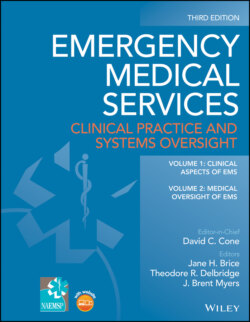Читать книгу Emergency Medical Services - Группа авторов - Страница 231
Nitroglycerin
ОглавлениеNitroglycerin is a time‐honored treatment to relieve chest pain due to angina by decreasing myocardial oxygen demand and increasing collateral blood flow to ischemic areas of the heart. Somewhat surprisingly, nitroglycerin is not effective at reducing STEMI patient mortality [35]. Also, the response, or lack thereof, to nitroglycerin administration is not an accurate diagnostic test to determine whether cardiac ischemia is the underlying cause of a patient’s chest pain [36]. For example, because it relaxes smooth muscle, nitroglycerin may also relieve pain in patients with esophageal spasm.
Nitroglycerin can be administered as sublingual tablets or an oral spray. The usual dose for either method of delivery is 0.4 mg. Although up to three doses can be given, at intervals of 5 minutes between doses, current AHA/ACC recommendations for self‐administered patient use of nitroglycerin is for people to call EMS if chest pain is not improved 5 minutes after single dose of nitroglycerin. In so doing, STEMI patients avoid a potential 15‐ to 20‐minute delay before activating the EMS system [15, 16].
Although there is no difference in the incidence of nitroglycerin‐induced hypotension between groups of patients with inferior versus noninferior wall STEMI, nitroglycerin should be avoided in several groups of patients with chest pain [37]. Patients who have used phosphodiesterase inhibitors and then take nitrates can have profound, refractory hypotension. Nitrates generally should be avoided for 24 hours following sildenafil or vardenafil use and for 48 hours following tadalafil use.
Patients with a right ventricular infarction are dependent on right ventricular filling pressure to maintain cardiac output and a normal systolic blood pressure. If the patient has a systolic blood pressure below 100 mmHg or a heart rate below 60 beats per minute, nitroglycerin should be avoided until a 12‐lead ECG, including right‐sided leads, documents the absence of a right ventricular infarction. Nitroglycerin should also be avoided or used with caution in patients who already have systolic blood pressures <90 mmHg or heart rates <50 or >100 beats per minute [38].
